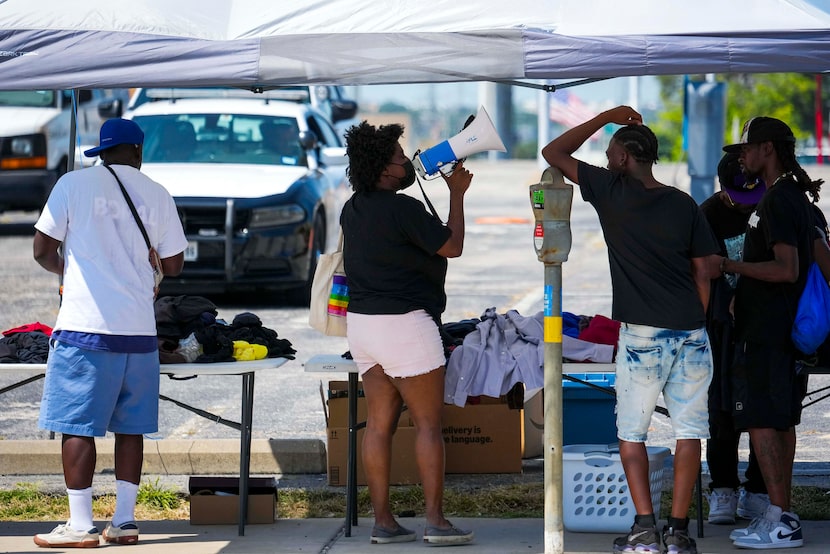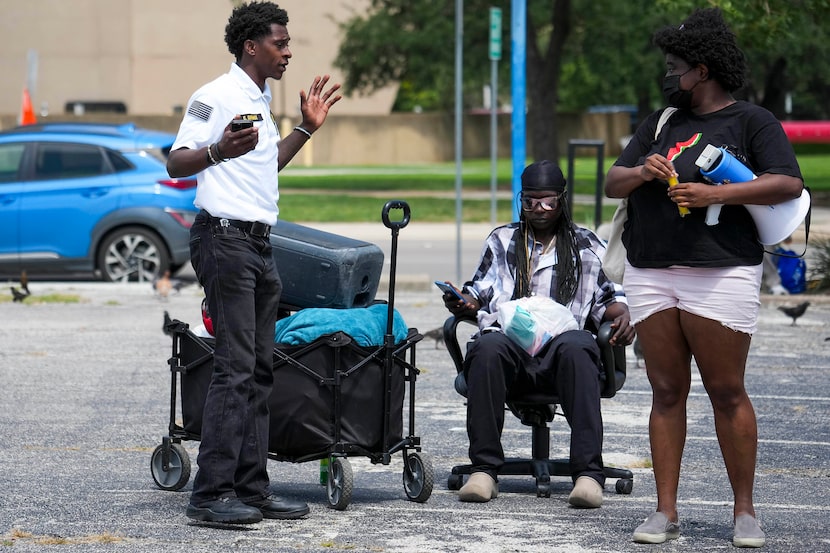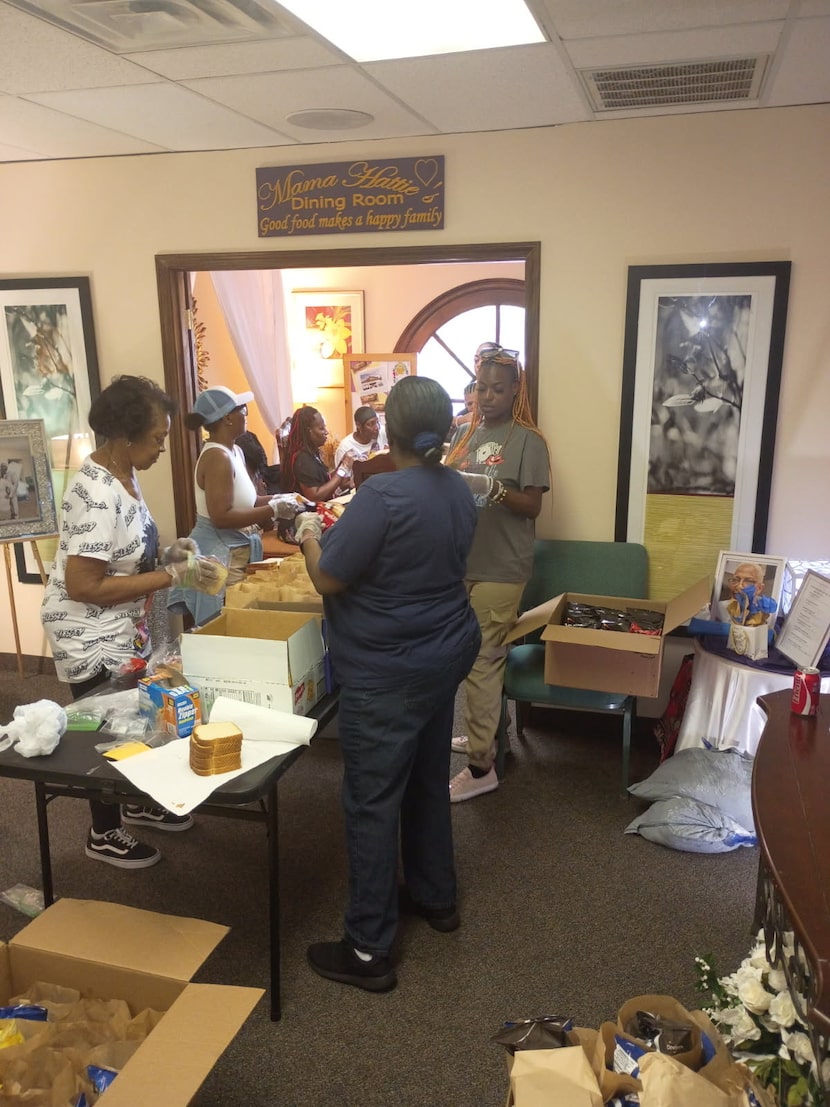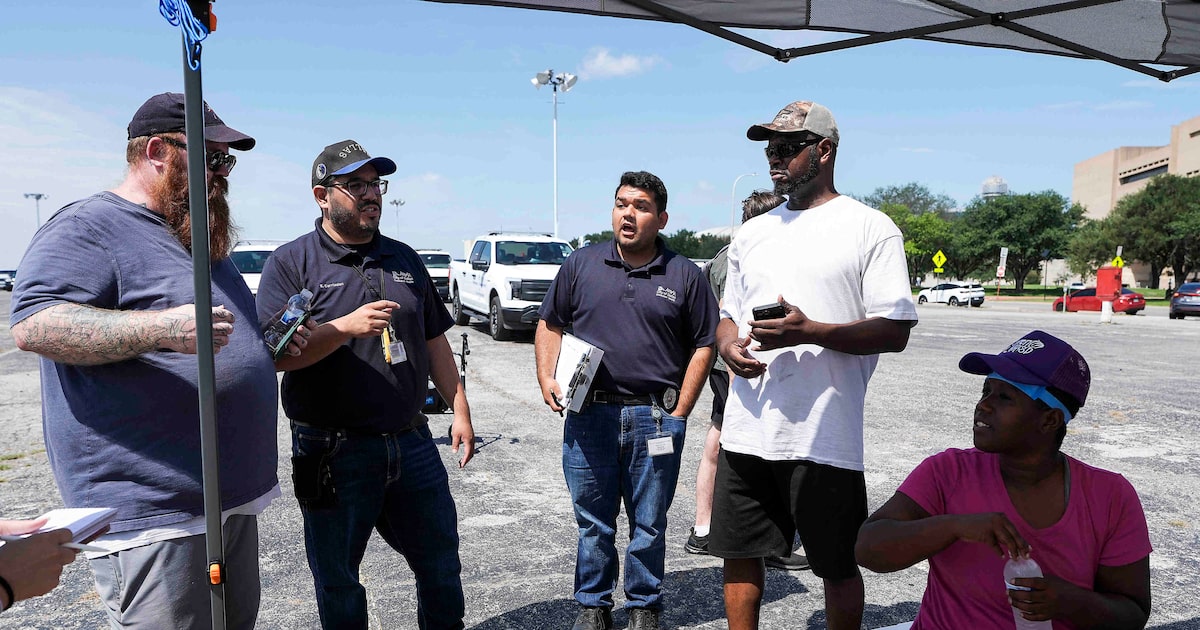For five years, Dallas Sandwich Sundays has set up shop behind City Hall to distribute food, hygiene supplies and clothes to people experiencing homelessness.
In July, the nonprofit got its first warning for violating the city’s feed the homeless guidelines by not notifying the city ahead of time of the food distribution.
Related:Sleeping won’t be permitted on downtown streets, Dallas officials say
Weeks later, on the hot Sunday morning of July 20, the group of volunteers installed several folding tables and pop-up canopy tents on the sidewalk. About 100 homeless people lined up to receive free food and supplies.
Breaking News
Dallas police and city marshal officers, code compliance inspectors, and staff from the Department of Emergency Management and Crisis Response and the Office of Homeless Solutions watched from their vehicles in the private parking lot adjacent to the sidewalk where the volunteers were installing the ‘free store.’
“They are doing this to intimidate us,” said Tanner Karnes, vice president of Dallas Sandwich Sundays. “We are not going anywhere.”
Dallas officials have been cracking down on nonprofits and residents providing food and serving people in need on the city’s streets and parking lots. Dallas officials have said it’s part of a broader initiative to provide long-term solutions to downtown, but advocates feel they’re being unfairly targeted for helping people who are homeless.

Dallas City Marshal watches from a parking lot as volunteers with the aid group Dallas Sandwich Sundays set up to distribute food, clothing and other supplies to people experiencing homeless along South Ervay Street on Sunday, July 20, 2025, in Dallas.
Smiley N. Pool / Staff Photographer
The city updated its guidelines for feeding the homeless over a decade ago. These guidelines include a 24-hour advance notice on feeding events hosting 75 or more individuals, providing trash bags for clean-up after the work is complete, wearing disposable gloves, using hand sanitizer as needed and transporting food in clean containers.
Karnes said the city is only now enforcing its ordinance to encourage homeless people and those who serve them to stay away from downtown as part of its broader initiative to revitalize the urban core ahead of the FIFA World Cup.
Related:Trump orders crackdown on homeless encampments
During an editorial meeting with The Dallas Morning News in late June, Dallas City Manager Kimberly Tolbert said that street feeding was problematic and addressing it was part of the Street-to-Home Initiative, which aims to find a home for those experiencing homelessness and includes banning sleeping in downtown public spaces.
“The response teams are truly working together, and we’re continuing to address issues around street feeding, which is problematic,” Tolbert said. “And that’s been some of the challenges that we’ve experienced with the individuals that show up on the weekends and pop the trunk, they’re passing out food, and then all the trash is left on the street.”
Kevin Oden, director of the Department of Emergency Management and Crisis Response, said his department was tapped early this year to lead the city’s response to reduce homelessness by working with multiple departments to close encampments and rehouse people.
Related:Dallas’ homelessness response needs clearer goals, audit says
When it comes to feeding the homeless, Oden said his team is out there to ensure that these types of events follow the city’s code and people are being served safe and healthy food.
Following the guidelines
The Friday before the Sunday distribution, the group emailed the city to notify them that they would be conducting the free store and to provide information about the streets where they would be located.
Vincent Vasquez, a customer representative with code compliance, replied to the email requesting the group collaborate with agencies that provide services to the homeless in the area.
“Here are a few organizations located near the downtown area: The Bridge Recovery Center, Austin Street Center, Dallas Life Shelter and Our Calling,” reads the email provided to The News. “Please contact these organizations and arrange to volunteer at their locations to help minimize risk.”
The group replied to the city that they would not.
“We are a 501c3 nonprofit and will not be collaborating with anyone,” reads the email. “We have been serving people weekly here for over five years now and will continue.”

A security guard asks volunteers with the aid group Dallas Sandwich Sundays to remain on the sidewalk and out of a parking lot as they distribute food, clothing and other supplies to people experiencing homeless along South Ervay Street on Sunday, July 20, 2025, in Dallas.
Smiley N. Pool / Staff Photographer
David Woody III, president and CEO of The Bridge Homeless Recovery Center, said he appreciates the compassion and good intentions behind street feeding and recognizes that many people are motivated to help when they see others in need.
He is concerned about potential health risks, such as food-borne illness, caused by improperly stored or prepared food, especially for individuals with health complications.
“The first way we connect with folks is through a meal. They come onto the campus, eat a nutritious meal, and then what does that?” Woody said. “That allows them to take advantage of getting a nice shower, some fresh clothing, basic hygiene, and if the individual has a physical health need, we have a Parkland clinic here.”
Related:Here’s how I’m trying to pay back my homeless mentor
Woody said the trash left after a street food distribution has a negative impact on the nearby neighborhoods. Often, volunteers from his organization clean to continue to have good relationships with the neighbors and businesses in the area.
Maria Millis, the communication manager with Our Calling, said they also understand the city’s request not to provide food directly to the homeless.
“We find that it can be a source of enablement [street feeding] rather than a solution. Our goal at OurCommunity is long-term stability,” Millis said. “When our neighbors visit our navigation center, we are able to provide so many more resources. Our goal is long-term solutions rather than single interactions.”
Millis, like Woody, said they encourage individuals to donate their time and resources to established shelters and organizations to provide long-term solutions to the complex issue of homelessness.
Feeding behind City Hall
On Sunday, as the volunteers finished setting up the tables and music was playing, multiple city authorities got out of their vehicles and asked the group how the peanut butter and jelly sandwiches, packed in Ziplocs, were prepared.
The code inspectors checked if hand sanitizer was available and if the sandwich distributors were wearing gloves.
People in the line waiting for the food distribution started to yell at the officers and asked them to leave. Everything was in order, code officers took some notes and returned to their vehicles.

Volunteers with the aid group Dallas Sandwich Sundays set up to distribute toiletries, food, clothing and other supplies to people experiencing homeless along South Ervay Street on Sunday, July 20, 2025, in Dallas.
Smiley N. Pool / Staff Photographer
Two weeks before, on Sunday, July 6, as the group was setting up, they had a similar situation where all those city authorities showed up. That’s when they received a warning for not notifying the city ahead of time.
“Anyone engaging in unsheltered feeding within the city of Dallas has to strictly adhere to those guidelines,” said Cedric Secoundiata, assistant director of code compliance.
Secoundiata said as of July 25, the city has not issued citations but only warnings of violations.
After receiving the warning, Karnes and the group decided to contact the Texas Civil Rights Project, a nonprofit organization that advocates for the civil rights of all Texans.
In 2024, the group filed a lawsuit against the city of Houston for “violating the First Amendment through its anti-food sharing ordinance that attempted to criminalize food sharing.”
A month later, a U.S District Court judge ordered the city of Houston to immediately stop enforcing a decades-old law that required organizations that provide free meals to request permission before feeding more than five people on any property within the city.
Travis Fife, an attorney in the criminal legal program at the Texas Civil Rights Project, said what the city of Dallas was doing by issuing these warnings is another instance of the criminalization of homeless people and those who try to provide support for them.
“When you have a group like Sandwich Sundays that is providing life-saving support and resources to people, especially during the hot summer months,” Fife said, “and then if you’re intimidating people or deterring people from accessing a place where they can get support, I think it’s really counterproductive and harms the health and safety of our homeless neighbors.”
LaShonda Reid, the treasurer at Dallas Sandwich Sundays, said city authorities will not intimidate her, and she will continue to provide resources for those in need.
But Dallas Sandwich Sundays is not the only group that has had encounters with the city in an effort to feed the homeless.
As Dallas Sandwich Sundays was cleaning up on Sunday, July 20, the tables and trash from the free store, Pastor Roy Fuller from The Rock Church of Dallas in DeSoto and people from his congregation started to get out of their cars with meals to give away.

Volunteers from The Rock Church of Dallas in DeSoto prepare sandwiches to deliver behind Dallas City Hall.
Pastor Fuller and his congregation have traveled downtown semiannually to give away warm meals, hygiene products and clothes for three years. Photo provided by The Rock Church of Dallas in DeSoto.
Courtesy
For three years, Fuller and his congregation have traveled downtown semiannually to give away warm meals, hygiene products and clothes.
He was surprised to see all the city authorities present and said they had never had issues with the city for feeding the homeless.
“It shouldn’t be a problem,” Fuller said. “Someone in our church told me that this was happening. That the city was behind the people serving those in need.”
Fuller said the city patrol unit stayed with his group the whole time they were giving away the 500 brown bag lunches.
Like Dallas Sandwich Sundays and other individuals who just pulled up to the streets behind City Hall, opened their trunks, and started giving away food and supplies to the homeless, the city’s multi-disciplinary team went around and asked them how the food was prepared and who they were.
Andrew Rollo, a manager with the emergency management crisis response from the Dallas Street Response team, said the city’s most significant focus on addressing street feeding is downtown, specifically behind City Hall.
Rollo said his team spends most of its Saturdays and Sundays in the area due to the high presence of food providers, but it is enforcing the guidelines all over the city.
